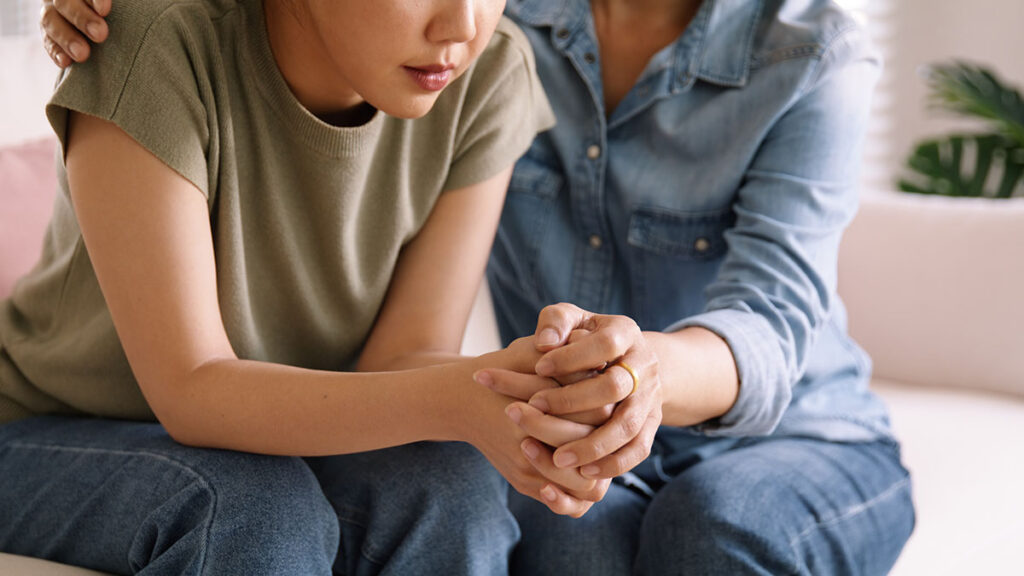Anxiety disorders are the most prevalent mental health condition in the U.S., affecting up to 18.1% of the population annually. The chances that you know someone with anxiety are fairly high, so learning how to help someone with anxiety is a skill that could help them feel supported as they learn the skills to cope with their feelings.
At BRC Healthcare, we know how challenging it is for people living with anxiety and other mental health conditions—especially when they co-occur with substance use disorders or process addiction. Our team of professionals is experienced in guiding our clients through the early stages of recovery while teaching them how to regain a sense of control over their mental health. Learn more about our anxiety and addiction treatment programs at Makana Path and BRC Recovery Center near Austin, TX today by calling 888.559.2036.
What Is Anxiety?
The first step in helping a friend or loved one with anxiety is educating yourself on these types of mental health conditions. While everyone gets worried or nervous occasionally, an anxiety disorder is a pervasive problem that can be highly disruptive. Someone with anxiety might get paralyzed with fear over situations most people wouldn’t give a second thought about, such as going to a party or traveling in a car.
Because anxiety can seem irrational, you may feel tempted to dismiss your loved one’s concerns by saying things like, “Don’t be such a worrywart,” or “You’re making a mountain out of a molehill.” However, it’s crucial to be sensitive to what someone with anxiety is going through, even if it doesn’t make much sense to you. Instead, ask them how you can best provide support during moments when their anxiety seems overwhelming. Validate that what they are feeling is real to them.
Types of Anxiety Disorders and Their Symptoms
The U.S. Department of Health and Human Services has identified five primary categories of anxiety disorders:
- Generalized anxiety disorder
- Obsessive-compulsive disorder
- Panic disorder
- Post-traumatic stress disorder
- Social phobia
Anxiety can manifest itself in physical symptoms, such as sweating, shallow breathing or an elevated heart rate. Often, people with anxiety disorders struggle to maintain a positive outlook because of their persistent belief that the worst-case scenario will happen. Instead of confronting their fears head-on, they may practice extreme avoidance, such as refusing to attend social gatherings. They might also resort to repetitive or compulsive behaviors that they believe will prevent negative consequences, such as washing their hands over and over.
Encourage Someone with Anxiety to Seek Help
While anxiety disorders are highly treatable, many people living with anxiety fail to get the counseling they need to live fulfilling, happy lives. As a result, their anxiety could worsen, trapping them in a cycle of worry and fear. They may also develop co-occurring mental health issues such as depression or substance abuse.
Learning how to help someone with anxiety might go against your instincts since enabling their feelings could make their anxiety worse. As much as you might want to support your friend or family member, do your best to avoid feeding their anxiety by going out of your way to make them feel safe. Making changes to help your loved one avoid their source of concern doesn’t let them overcome fears and address the underlying cause of their anxiety. Instead, it restricts their world as their growing anxiety increasingly limits what they feel comfortable doing.
Help for Anxiety and Addiction at BRC Healthcare
Understanding how to help someone with anxiety is not an easy task, but you can make progress. As you learn to recognize the symptoms of their anxiety, you can guide them to the support they need at the moment.
If your loved one lives with anxiety or struggles to manage their feelings to the point they’ve turned to substance use or addictive behaviors, it’s time for professional help. BRC Healthcare offers comprehensive dual diagnosis treatment for anxiety and addiction in the Austin, TX area. Contact us today by calling 888.559.2036 for more information on how we can help.


